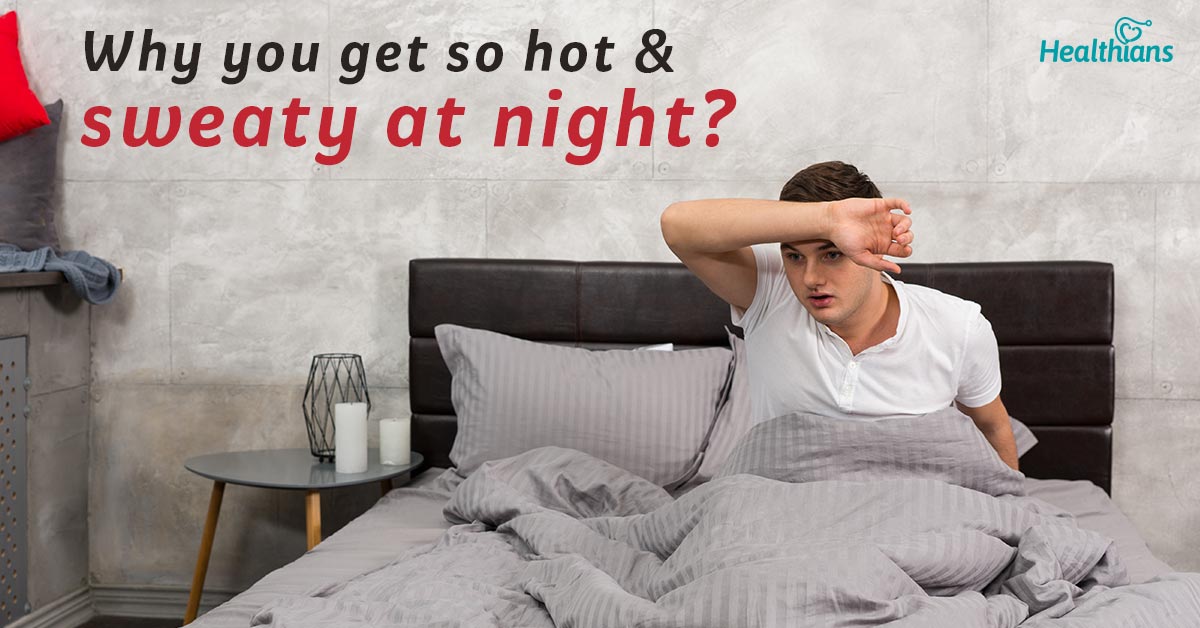Contributed by – Healthians Team
Night sweats also known as Sleep Hyperhidrosis, is “excessive sweating at night”. It is a result of repeated episodes of extreme perspiration resulting in drenched sleepwear and sheets and can also be unrelated to an overheated sleeping environment. Individuals experiencing night sweats typically wake in the middle of the night to find their bedclothes and bedding drenched, even if their bedroom temperature is cool. Though this abnormal sweating can be annoying and is usually risk-free; it can be a sign of underlying medical condition.
Why do we sweat?
Sweating is body’s natural mechanism to cool down the body. Hypothalamus present in our brain regulates the body temperature leading to the stimulation of over 2 million sweat glands, which help to keep us cool. As the sweat evaporates from the skin, it releases heat energy, which, in turn, cools the body. This is experienced majorly during day time, but with an increase in humidity levels or temperature, sweating at night is also common.
Causes of night sweats
Sweating at night while sleeping can result from a harmless situations or serious disease. They can be the common side effects of any medications or medical conditions. Let us have a look at the various causes of night sweats:
Infections
There are various types of infections which causes fever and are associated with night sweats like;
- Tuberculosis
- Influenza
- HIV
Hormonal imbalance
There are various hormone imbalances that occur along with menopause, diabetes, thyroid disease, puberty, and pregnancy. During the menopausal transition, women mostly experience night sweats along with hot flashes. Adrenal Gland tumour like Pheochromocytoma, carcinoid tumour also leads to night sweating.
It is not only the females who suffer from night sweats, even men are equally affected. What causes night sweats in men is something which people sometimes wonder. Men having very low levels of testosterone may experience night sweats. It is also common in men who are on hormone therapy for treating prostate cancer.
Gastroesophageal reflux disease (GERD)
It is a chronic digestive disease. This occurs when stomach acid or, occasionally, stomach content, flows back into the food pipe (oesophagus). The backwash (reflux) irritates the lining of the oesophagus and causes GERD. The main symptom of GERD is heart burn but it also causes night sweats.
Cancer
Night sweats are early symptoms of cancer. The most common type of cancer associated with night sweat is Lymphoma.
Anxiety
People suffering from anxiety disorders or depression mostly complain of night sweats. So it’s good to keep a check on it.
Hypoglycemia
It is a condition in which the blood sugars levels go down. People with diabetes who are on insulin or oral anti-diabetic medications may experience hypoglycemia during night, which is accompanied with sweating. Hence, its advised to keep your sugar levels under control for a peaceful uninterrupted sleep.
Neurological conditions
There are some uncommon neurological conditions that can also lead to increased sweat production and cause night sweating. These conditions are
- Autonomic dysreflexia
- Post-traumatic Syringomyelia
- Stroke
- Autonomic neuropath
Medications
Night sweats area common side effects of certain medications like
- Anti-depressants : These are the medications taken to treat depression
- Hormone-blocking drugs : These are used to treat certain cancers (hormone therapy)
- Hypoglycaemic Drugs: Drugs used to control diabetes.
Treatment for night sweat
How to stop night sweats is something which we all wonder about. To treat them it is important to distinguish night sweats that arise from medical causes from those that occur because one’s surroundings are too warm or any other cause. Doctors mostly refer to true night sweats as severe hot flashes, which occur at night and it can drench sleepwear and sheets. They are not related to an overheated bedroom or sleeping environment.
Night sweats are usually harmless. Conversely they can be a sign or indication of an underlying medical condition. One should visit a doctor if night sweats:
- Are occurring on regular basis
- Interrupting the sleep
- They are accompanied by fever, weight loss, localized pain, cough, diarrhoea, or other symptoms of concern
- Comes after the menopause symptoms have been absent for months or years
Night sweats treatment will depends upon the underlying cause such as correcting the hormone irregularities, adjusting medications, treating the medical condition. People experiencing unexplained night sweats must seek timely medical care to identify the true cause and addressing it correctly.




